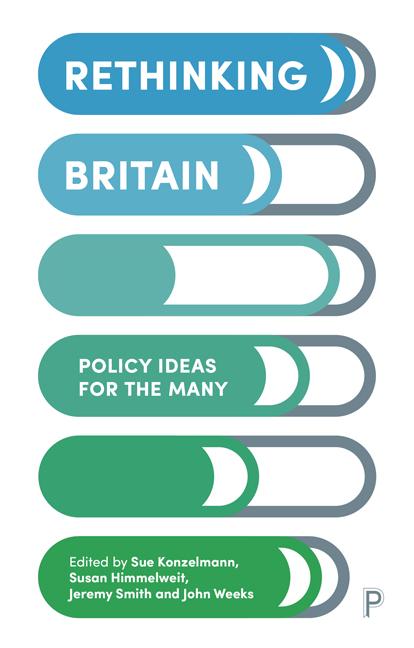Book contents
- Frontmatter
- Contents
- List of Tables and Figures
- The Contributors
- Foreword
- Introduction
- Interlude: ‘Mirror, Mirror, On the Wall – Who has the Highest Debt of All?’
- Part One Building a Full-Employment Economy: Introduction
- Part Two Public Investment – Prioritising Society Rather than Profit: Introduction
- Part Three Making Finance Work for Society: Introduction
- Part Four Genuine Social Security: Introduction
- Part Five How to provide for Social Needs: Introduction
- Conclusion
- Jargon Busters
- References and Further Reading
- Index
3 - What’s the Best Way to Tackle Health Inequalities?
Published online by Cambridge University Press: 11 March 2021
- Frontmatter
- Contents
- List of Tables and Figures
- The Contributors
- Foreword
- Introduction
- Interlude: ‘Mirror, Mirror, On the Wall – Who has the Highest Debt of All?’
- Part One Building a Full-Employment Economy: Introduction
- Part Two Public Investment – Prioritising Society Rather than Profit: Introduction
- Part Three Making Finance Work for Society: Introduction
- Part Four Genuine Social Security: Introduction
- Part Five How to provide for Social Needs: Introduction
- Conclusion
- Jargon Busters
- References and Further Reading
- Index
Summary
What's the issue?
The UK has the longest and strongest tradition of research on the social determinants of health and health inequalities of any country, more government papers and reports, and more policy. Yet British governments have struggled to reduce inequalities in health.
What policies would be most effective in reducing health inequalities?
Analysis
The Labour governments of 1997–2010 pursued a comprehensive programme to reduce health inequalities, and made progress in doing so. Their 1999 plan, Reducing Health Inequalities: An Action Report (Macintyre, 1999), adopted many of the recommendations from the 1998 Independent Inquiry into Inequalities in Health. Their economic and social policies included a national minimum wage, higher benefits and pensions, the ‘Sure Start’ programme, health action zones and increased spending on education, housing, health and urban regeneration. In 2001, the government set targets for health inequalities with the goal of narrowing differences in life expectancy across geographic areas and in infant mortality across social classes. From 2002 to 2010, it published a series of reviews and action plans to tackle health inequalities, culminating in the 2010 Marmot Review, Fair Society, Healthy Lives (Marmot, 2010).
The most recent research on inequalities in health in England, published by Barr, Higgerson and Whitehead in the British Medical Journal in 2017 (Barr, 2017), assessed trends in life expectancy in three periods: before the 2003 Programme for Action, during the implementation of the programme, and subsequently in the coalition/Conservative era. The analysis shows clearly that the programme was associated with a decline in geographical inequalities in life expectancy that reversed a previously increasing trend. Since the programme ended, inequalities have started to increase again.
A growing body of evidence, published in top medical journals, demonstrates the impact of austerity on population health since 2010, including a shocking rise in infant mortality among the poorest social classes, and an alarming increase in the North–South divide in death rates for adults aged 25–44. The evidence indicates that there have been tens of thousands of excess deaths among the elderly, increasing numbers of suicides and the end of a century-long rise in life expectancy.
- Type
- Chapter
- Information
- Rethinking BritainPolicy Ideas for the Many, pp. 195 - 198Publisher: Bristol University PressPrint publication year: 2019



